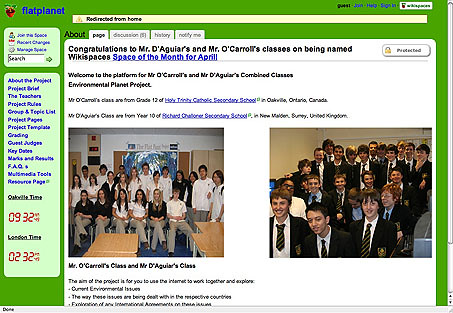Found this article in a news link the other day. It seems that the growing list of terminology surrounding the “new web” (can I call it that?) is getting up some people’s noses…
“Blog”, “netiquette”, “cookie” and “wiki” have been voted among the most irritating words spawned by the Internet, according to the results of a poll published on Thursday. Topping the list of words most likely to make web users “wince, shudder or want to bang your head on the keyboard” was folksonomy, a term for a web classification system. “Blogosphere”, the collective name for blogs or online journals, was second; “blog” itself was third; “netiquette”, or internet etiquette, came fourth and “blook”, a book based on a blog, was fifth. “Cookie”, a file sent to a user’s computer after they visit a website, came in ninth, while “wiki”, a collaborative website edited by its readers, was tenth.
I must say that I quite like the term “blogosphere”, although to be fair it didn’t make much sense to me until I became a blogger myself. However, I think it describes the blogging ecosystem rather well. It is amazing the way that we who write blogs all seem to become interlinked together… My friend Simon was telling me that when I published a podcast recently about his Flat Planet Project, the site hits on his wiki spiked into the hundreds over the next few days. It really is a very connected world.
Whenever I talk to teachers about blogging with their students, the usual first questions are “How will anyone ever find what we wrote?”, and “Why would anyone read what we write?” These are obvious questions, but to ask them is a great underestimation of just how big the Internet really is and the curiousity levels of the people who use it. I don’t really know how people find it, and why they read it. But I know they will and they do. I can’t explain how and why, but I know it works. If you build it, they will come.
One of the very first posts I ever wrote on this blog was about the nature of blogging as I naively understood it at the time. One of the things I wrote back then (that I now understand with much greater appreciation) is this…
…the true worth of blogging cannot be appreciated on a small scale. A single blog post, or even a single blog, is not what it’s all about. Blogging gets it’s power from becoming a large scale ecosystem, a thriving community of people all cross linking to each other, creating connections and networks of ideas. The power of blogging is way more than the sum of its individual parts, and to gauge the power of this new medium it needs to be seen in the light of the much bigger picture that it creates.
To me, the word “blogosphere” works well to describe that concept of connectedness between bloggers. I cannot think of a better pre-Web2.0 word to describe the same thing. Besides, I’m told that Shakespeare invented many words and phrases that did not exist before he dreamed them up… If he was trying to express an idea and there was not a readymade word to adequately say it, he just made one up. In fact, he made about 1700 of them up, according to one source I looked at.
The funny thing about that early post I wrote was that it was written in response to a book I read about blogging called “Who Let the Blogs out” by a fellow called Biz Stone, (Biz was behind things like Xanga, Odeo and Twitter). Within a week or so of me posting it, I stumbled across a response on Biz’s blog where he was commenting on my blogpost which was originally commenting on his book. As a beginning blogger, it was at that point that I realised just how truly interconnected we all are through this “blogosphere” thing.
So, like it or not, Blogosphere it is.
technorati tags:blogosphere, blog, connectedness


 A friend sent me an email with this note in it. I had a chuckle at the intended humour, and quickly realised just how close to the mark it really was. I made a few minor modifications to it, but here it is…
A friend sent me an email with this note in it. I had a chuckle at the intended humour, and quickly realised just how close to the mark it really was. I made a few minor modifications to it, but here it is…